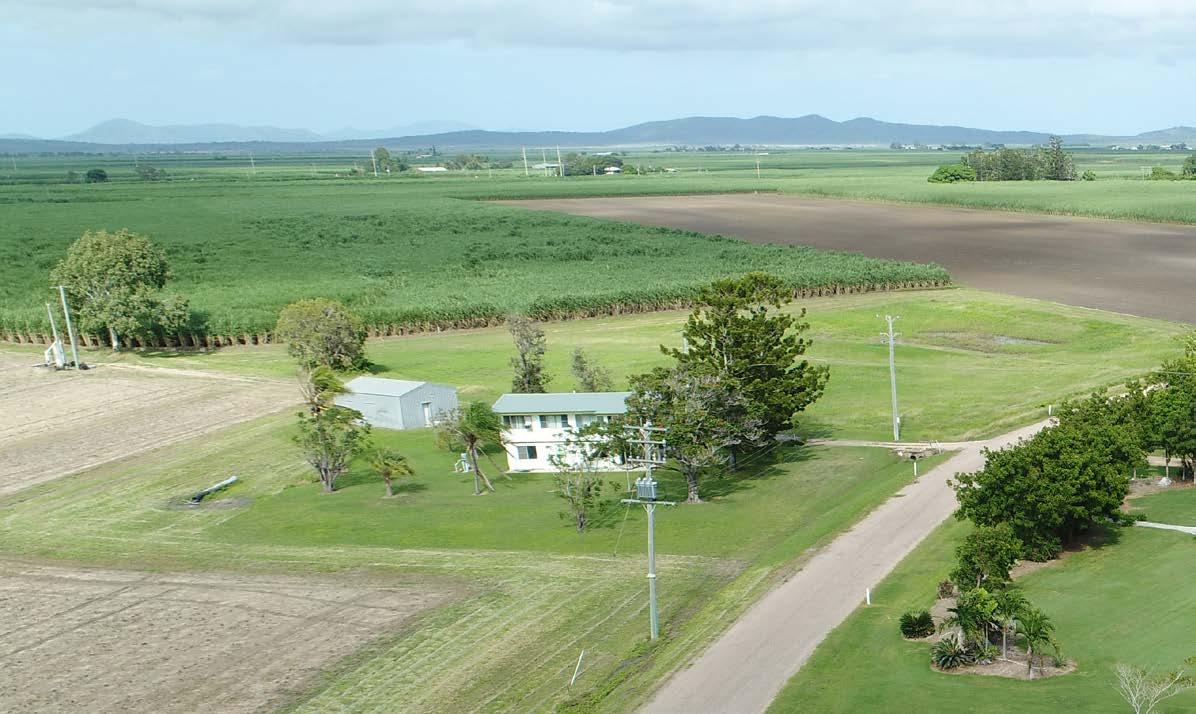
8 minute read
Senate inquiry mirrors reef regs problems
Senate inquiry result mirrors reef regs problems
The failure of senators to reach a consensus on the veracity of the evidence base behind reef regulations is symbolic of the confusing, divisive and politicised nature of the regulations themselves.
Advertisement
Following a year-long inquiry, the Senate Rural and Regional Affairs Committee handed down two conflicting reports on the evidence behind the Queensland Government’s latest round of reef regulations.
While the committee’s majority report supported the continued regulation of farming practices, and largely dismissed the need for greater scrutiny of the science used to justify regulation, it did call for greater transparency to give growers confidence and recommended increased funding for on-farm extension programs.
A separate dissenting minority report, from LNP committee members senators Susan McDonald, Gerard Rennick and Matt Canavan, came out strongly in favour of the key recommendations that CANEGROWERS made in its submission to the inquiry, including: Removing the regulatory burden on growers and adopting long-term support for on-farm innovation; Restoring growers’ confidence in policy through a review of the way the science used to justify it is managed and scrutinised; Ensuring water quality targets are credible and realistic; and developing trustworthy methods for evaluating improvements in farm practices and water quality.
CANEGROWERS notes on the inquiry recommendations
Recommendation 1 The committee recommends the Australian and Queensland governments ensure adequate stakeholder engagement and education processes are integrated into future Water Quality Scientific Consensus Statement processes. Growers don't need to be educated or condescended to. They need to be consulted, listened to, and recognised for the good work they've already done.
Recommendation 2 The committee recommends the Australian and Queensland governments improve consultation, information, accessibility and transparency of data used to inform the findings of the Paddock to the Reef Integrated Monitoring, Modelling and Reporting Program. Won't solve the serious flaws in the Paddock to Reef program or unrealistic water quality targets.
Recommendation 3 The committee recommends the Australian Government continue to uphold its responsibilities under the precautionary principle in the Great Barrier Reef Marine Park Act 1975.
Recommendation 4 The committee recommends the Australian and Queensland governments ensure future Reef report cards adequately incorporate and recognise the adoption of best practice across the sugarcane sector. Best practice defined by Smartcane BMP or defined by government in water quality targets?
Despite the committee’s failure to agree, CANEGROWERS CEO Dan Galligan said he doesn’t view the year-long process as a waste of time and resources.
“While we accept that senators on all sides went into this process with open minds and a genuine hope of understanding the issue, their failure to find consensus reflects how complex and politically charged the issue is,” he said.
“CANEGROWERS remains opposed to the use of farm-based regulations to support water quality outcomes, particularly those embedded in the 2019 Queensland Government legislation.
“The inquiry provided an opportunity to ventilate the many very serious concerns around the impacts of reef regulations and the lack of evidence to justify them. “Farmers across the state support a healthy, dynamic and much-loved Great Barrier Reef. We simply do not support the policy decision made by the State Government to regulate farmers to secure this outcome.”
CANEGROWERS committed significant resources to bring evidence before the inquiry, with grower representatives from eight cane-growing regions attending hearings in Brisbane. “Growers discussed the range of activities they have implemented to demonstrate their world class sustainability credentials, evidenced by the fact that over 30% of Australian cane land is now accredited to the industry’s internationally recognised best practice program - Smartcane BMP” Mr Galligan said. During the course of public hearings, the senators heard from scientists that around 3% of the Reef may be impacted by land based run-off, with experts agreeing that climate change and extreme weather events are by far the most significant threats to its health.
Some senators appeared genuinely puzzled as to why growers had not been recognised and commended more for practice changes achieved to date.
CANEGROWERS tabled an independent economic assessment which showed that measures outlined in the latest round of reef regulations, including fertiliser rates below the industry SIX EASY STEPS rates, could result in a $1.3 billion hit to the Queensland economy over the next decade.
Recommendation 5 The committee recommends the Australian and Queensland governments conduct a strategic review of the communication strategy used to inform stakeholders about Great Barrier Reef policies and science. This won't fix the underlying problems with the policies and strategy.
Recommendation 6 The committee recommends the Australian and Queensland governments' commission additional research into the impact of the horticulture and banana industries (including small-scale agro-ecological farmers) on water quality in the Great Barrier Reef catchment regions.
Recommendation 7 The committee recommends the Australian and Queensland governments, in partnership with Reef science research bodies, agricultural representatives, natural resource management bodies and other stakeholders, establish a Great Barrier Reef water quality forum.
Recommendation 8 The committee recommends the Australian and Queensland governments explore future opportunities to establish water quality research projects that incorporate citizen science principles throughout the Great Barrier Reef's catchment regions. Problems are bigger than a forum can solve! CANEGROWERS wants a review of the funding, quality, synthesis and communication of research used to inform reef policy.
Is this about growers being equal partners in local projects to measure water quality outcomes?
Reef credits fanfare greeted with caution
The first purchase of reef credits has taken place in Queensland, marking the launch of a scheme that aims to turn water quality measures on farms into tradeable units. CANEGROWERS sees value in the concept but wants more rigorous assessment of the assumptions and economics.
Developed and offered by a company called GreenCollar, the first reef credits were purchased by the bank HSBC Australia and the Queensland Government.
GreenCollar says the voluntary scheme is a new environmental market that pays landholders for certain on-farm actions that improve water quality entering the Great Barrier Reef.
The first credits were developed in the Tully region and CANEGROWERS Tully Chairman Jamie Dore (pictured) was
involved in a pilot program, putting his hand up to get the details and look at it from an economic and legal perspective for growers. For the pilot, SIX EASY STEPS (6ES) was used to get to the lowest rate of fertiliser possible without risking yield or profitability and the credits were generated. CANEGROWERS thanks Jamie for his work with the developers and supports initiatives where growers are recognised and potentially rewarded for good land management.
However, CANEGROWERS is concerned that beyond the pilot program, reef credits will be linked to the government's problematic and unrealistic 2050 Reef water quality targets and their intent of reducing nitrogen rates below 6ES. Read more analysis on page 30. GreenCollar estimates there could be six million credits to be generated in reef catchments including credits for projected reductions in dissolved inorganic nitrogen, sediment and pesticides in water. “The investment required to meet water quality targets for the Great Barrier Reef is estimated at $4 billion, and this announcement provides an exciting opportunity for corporations, landholders and government alike to make their own contributions to this target,” James Schultz, GreenCollar Co-Founder and CEO, said.
CANEGROWERS says reef credits could hold some potential for growers to supplement their incomes but more information is needed on how the price of a reef credit is determined and whether the market will be transparent. Ultimately, it will be up to growers to determine if reef credits are appropriate for them when all of the information is available as each farm situation is different.
What are reef credits?
Reef credits are a tradeable unit. They are generated by activities which improve water quality flowing to the Great Barrier Reef. The credits are verified and administered by an independent company. Buyers of reef credits purchase them as part of their environmental, social and governance strategies.
YourpartnersinAgribusiness Tax&Accounting Audit&Assurance Insurance Succession Planning Private wealth Bookkeeping&Payroll



Therese Scotton
Partner
(07) 4951 1455| www.sbbpartners.com.au| Lvl 1,122 Wood Street,Mackay
200k drums saved from landfill
Growers in Queensland's Hinchenbrook region have saved the equivalent of 4,600 cubic metres of plastic and steel from being dumped in landfill as part of Agsafe's successful drumMUSTER program.
Since the program commenced in the region in June 2002, over 214 tonnes of agricultural and veterinary containers have been collected.
That's enough to stretch from Ingham to Euramo if lined up, drumMUSTER Regional Consultant for Queensland Colin Hoey said. "Growers in the Herbert Valley should be very proud of their commitment to the environment and in turn the success of the drumMUSTER program. "I have seen them leading the way in Far North Queensland for many years now," Mr Hoey said. "This is a significant result from a shire that has been one of the shining lights of the cane growing regions of Queensland. "The growers have consistently supported the drumMUSTER program and in doing so have shown a great respect for the environment. "The utilisation of one of the largest agricultural stewardship and recycling programs in Australia proves farmers want to not only support, but champion sustainable farm management practices." Hinchinbrook Mayor Ramon Jayo was also giving credit where credit is due. "I am pleased that our Herbert growers are being recognised for their commitment to the environment through their recycling efforts of chemical containers," Mr Ramon said.
"Farmers in general are regularly held out to be environmental vandals by various elements ignorant of the true facts and facts such as these assist in bringing out

the truth."













